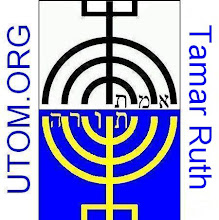Tehillim (Psalms) is a wonderful thing to read with our kids before bed. We bought a pocket sized Tehillim for each of our kids for Rosh Hashana a couple of years ago. We gave them that along with a $10 bill. We told them we wanted them to start the new year right with blessings and prosperity.
The Tehillim we bought has both Hebrew and English in it and is called the Metsudah Tehillim.
Chapter 1, verse 1 says: Fortunate is the man who has not walked in the counsel of the wicked, and in the ways of the sinful he has not stood, and in the seat of the scornful he has not sat.
I thought I would share how I went over this verse with my kids.
What are the actions described here? walked, stood, sat
When do we walk, sit and stand? We do these things all day long, after we wake up in the morning.
What is the fortunate man to avoid? counsel of the wicked, ways of the sinful, seat of the scornful.
There is a popular saying - walk the talk and talk the walk.
Basically, the walk is how we live our lives. Here it is saying not to walk in the counsel of the wicked. What does wicked mean? It means unscrupulous or capable of harm. Do we want counsel or advice from anyone who is capable of harming us? No, because we can also turn around and hurt others the same way. Its very important to watch the company we keep. Just because someone gives us advice does not mean its good advice, we need to consider the source.
Next is avoid ways of the sinful. What is the character of this person? Do they get themselves in trouble, how is their speech, who do they hang around with? We are not to stand in the way this person stands. There is an expression that says we need to stand up for ourselves. When we stand up for ourselves we are avoiding those who try to change us with bad habits-its resistance.
What does scornful mean? A person who will treat you as though you are worthless or have no value, as though you don't count. A person who looks at you with scorn is not a good thing! Each one of us count, our mitzvot count in Hashem's eyes and we will be rewarded for them, don't let someone steal these from you by making you feel you don't count.
Is it any wonder that Psalms starts in this way; telling us who we should avoid so we don't take on bad characteristics? This means a couple of things. If we are being told how not to act, then we are already starting out on the right foot. We come into this life with purity, not as a blank slate per say but as a good, wholesome soul. We are starting off on the right foot so this advice tells us how to stay on track. Also, verses tend to connect. You can't take one verse and use it alone. If this verse is telling us now not to act, who not be to with, then the next verse must tell us what we need to do to keep ourselves on the right path.
Verse 2 But only in the Torah of Adonai is his desire, and in his Torah he meditates day and night.
The Torah is not meant for scolars alone. It is meant for all of us. It has applications for us that are practical and also very spiritual-we are made of flesh but have a soul so we need both.
Its important for our kids to feel familiar and comfortable with the Torah, then they can relate with the fortunate man in Tehillim 1.
Shalom,
Tamar
Heightening the awareness of our Creator through Torah learning, teaching our children and getting back to basics.
Pages
Adventuresome Me

- Tamar Ruth
- Who I started out as is not who I have become! I grew up in a small town, very small...and all I wanted to do was move to the city. Now as an adult that small town has grown and is overcrowded. I want what I had as a kid...small town living. We don't appreciate what we have until it is gone. I water my plants with my rain barrel water,grow veggies in the front yard and want chickens and goats in the worst way. I married my high school sweetheart and after 18 years of marriage converted to Judaism. Did I mention I have 4 kids and I homeschool? My oldest son just graduated! The purpose of this blog is to share my experiences--homeschooling, being Jewish and loving it in a not so Jewish town, gardening, animals, and alternative medicines. So, if any of these things interest you---come along for the ride!
No comments:
Post a Comment